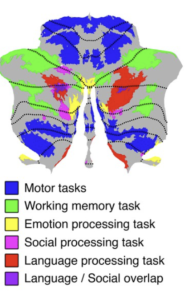Changes
Your brain is a complex system that controls your body, guides your thinking, and filters emotional responses. Because infratentorial superficial siderosis (iSS) causes progressive neural dysfunction, it's natural to be concerned about how a person's thoughts, feelings, and cognitive function may eventually become affected. If you or someone close to you begins to notice changes in mood, memory, problem-solving, or behavior, it may be time to visit a neuropsychologist.
What Is A Neuropsychologist
Neuropsychologists are licensed psychologists who specialize in brain function. They focus not only on the brain-behavior relationships of cognitive function: thinking, memory, language skills, and attention but also how brain injuries or damage affect your emotions and behavior.
Your visit will likely start with questionnaires filled out by you and someone familiar with your day-to-day activities. After the responses are reviewed and compared, you will continue into a clinical interview. Your neuropsychologist will ask various questions designed to help them decide what testing is appropriate for you. If you give your permission, they will also interview someone who can provide an outsider's point of view about your daily life. Often those closest to us are the first to notice when something is not quite right.

Source: Xavier Guell et al./eLife 2018 (Creative Commons)
What To Expect
Testing may take anywhere from two to six hours, with rest breaks between segments. Depending on what your interview reveals, you may be tested on your motor, cognitive, and perceptual skills. The Montreal Cognitive Assessment (MoCA), Mini-Mental State Examination (MMSE), or the Saint Louis University Mental Status Examination (SLUMS) are used to evaluate cognition. Manipulative tasks will test motor skills, puzzles, or drawing for spatial cognition, problem-solving, speaking, listening, and memory exercises. This testing is different than an MRI series in that it helps determine how well your brain is functioning.
Interpreting The Findings

Source: Xavier Guell et al./eLife 2018 (Creative Commons)
People spend a lot of time laying flat while they're sleeping, so the cerebellum often attracts a large amount of hemosiderin. In addition to motor function, it's important to realize the role the cerebellum plays in memory and cognition. Studies have mapped the areas of task activity controlled by the cerebellum and how neural damage results in a mix of problems. In addition to problems originating with the cerebellum, some SS patients will also experience oxidative stress induced neural damage in the supranatorial regions of the brain. It is possible for a patient to have siderosis in both the infratentorial and supratentorial areas of the brain.
Dementia Is Rare
While an impaired ability to recall newly learned information, mood or personality changes or difficulty with simple executive functions such as making plans or keeping thoughts in proper sequence is common in the later stages of SS, Dementia is the progressive decline of cognitive function du... More is very rare. Statistically, only a very low percentage of those diagnosed with infratentorial superficial siderosis will ever progress into true dementia.
Dementia is defined as a grouping of symptoms affecting memory, thinking, and social behavior enough to interfere with daily functioning.Signs include personality changes, One of the more common associated symptoms superficial sider... depression More , anxiety, inappropriate behavior, paranoia, agitation, hallucinations, and decreased verbal fluency. Patients will show difficulty finding words, reasoning and problem-solving, handling complex tasks, planning, organizing, coordination, motor functions, confusion, and disorientation.
Don't Ignore The Signs
If you are experiencing simple memory problems or something more serious, it's essential to have a baseline neuropsychological test result recorded in your medical record. These early scores will help your physician determine if you're holding steady or additional testing needs to be revisited at a future date. Stress, anxiety and depression are just as dangerous as loss of neural function.
Xavier Guell, Jeremy D. Schmahmann, John D.E. Gabrieli, Satrajit S. Ghosh. "Functional Gradients of the Cerebellum." Life, August 14, 2018 DOI: 10.7554/eLife.36652
Xavier Guell, John Gabrieli, and Jeremy Schmahmann. "Triple Representation of Language, Working Memory, Social and Emotion Processing in the Cerebellum: Convergent Evidence from Task and Seed-Based Resting-State fMRI Analyses in a Single Large Cohort." NeuroImage (First published online: February 2, 2018 ) DOI: 10.1016/j.neuroimage.2018.01.082
Jeremy D. Schmahmann and Janet C. Sherman. "The Cerebellar Cognitive Affective Syndrome." Brain: A Journal of Neurology (1998) DOI: 10.1093/brain/121.4.561
Jeremy D. Schmahmann. "Dysmetria of Thought: Clinical Consequences of Cerebellar Dysfunction on Cognition and Affect." Trends in Cognitive Sciences (1998) DOI: 10.1016/S1364-6613(98)01218-2
Updated: 08/26/2019
Updated: 10/07/2021

